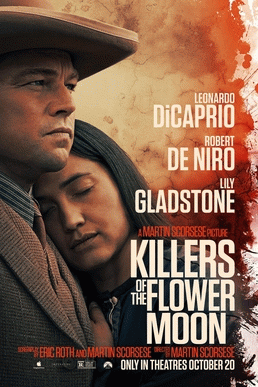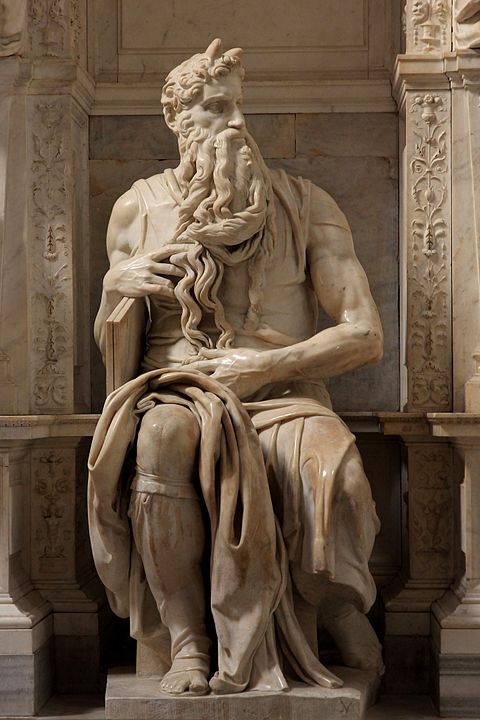The Black Gold God That Dirtied Us All
by John Kendall Hawkins
It would be pointless to bring up the subject of greed and covetousness, as history has provided so many lessons in our human failures to get along as a result of wanting more than the next guy has. Still, in reflecting on Martin Scorsese's latest film, Killers of the Flower Moon, and comparing it to the book by the same name that I just recently finished, carnal hunger came to mind.
I thought of Moses. I thought of how Michaelangelo carved out his features in a statue, the one with horns growing out of his head, the key concept here seeming to be that Moses and the Israelites were not far removed from the animality that moved humans back then, three thousands years ago or more. And yet, this leader of men, and this vital prophet, was stepping out of the darkness, stepping into the wilderness for 40 days and nights, we're told, to confer with God to develop rules of law to civilize the sneaky and jealous masses who killed and stole each others wives and property and flirted each day with chaos.
He came back with the mighty Decalogue and saw that his people had, in his absence, devised the likeness of a golden calf and were worshiping it, which enraged Moses so much he broke the tablets, maybe thinking, "Why did I bother?" But he mended the tablets and presented the 10 Commandments. These millenia-old laws against criminal acquisitiveness are the foundation of the three Abrahamic religions -- Judaism, Christianity, and Islam. Indeed, they are arguably the basis for the evolution of "our" ethics in the West. So, I was thinking about Moses and the riffraff he left behind to seek wisdom in the wilderness and how moral conditions had worsened in his absence, seeing upon his return folks worshiping Baal. No ethical standards were evident. Gold fever ran hot through the community.
I recalled descriptive passages early in Killers of the Flower Moon: The Osage Murders and the Birth of the F.B.I, the book by David Grann, on which the Scorsese film was based. The setting is frontier Oklahoma circa 1923. The Westward Expansion was underway and the fever for gold that came with the construction of the Transcontinental Railroad. Buffalo were wiped out. Indigenous lands were stolen and tribes beaten down. Chinese laborers worked as virtual slaves on the railroad expansion. As part of this vast movement, with all its energy and spirit of acquisitiveness, the Osage Nation had been forced to migrate from decent land they occupied in Kansas to what was thought to be rocky and hard scrabble terrain in Oklahoma.
Instead, one of the largest deposits of oil was discovered beneath Osage reservation land, making them filthy rich overnight, and setting white opportunists fantasizing about how such riches could be exploited. Grann sets the scene in Gray Horse, where part of the story takes place:
Gray Horse was one of the reservation's older settlements. These outposts including Fairfax, a larger, neighboring town of nearly fifteen hundred people, and Pawhuska, the Osage capital, with a population of more than six thousand seemed like fevered visions. The streets clamored with cowboys, fortune seekers, bootleggers, soothsayers, medicine men, outlaws, U.S. marshals, New York financiers, and oil magnates. Automobiles sped along paved horse trails, the smell of fuel overwhelming the scent of the prairies. Juries of crows peered down from telephone wires. There were restaurants, advertised as cafe's, and opera houses and polo grounds.
But that's not all it brings. Grann writes that with the rise and spread of these so-called "boomtowns" frontier law and order, such as it was, broke down. Grann observes:
Once, the tribe's enemies had battled them on the plains; now they came in the form of train robbers and stickup men and other desperadoes. The passage of Prohibition had only compounded the territory's feeling of lawlessness by encouraging organized crime and creating, in the words of one historian, 'the greatest criminal bonanza in American history.'
And he adds,
By one account, the amount of oil money had surpassed the total value of all the Old West gold rushes combined, and this fortune had drawn every breed of miscreant from across the country.
Criminal bonanzas seem to be the American elite's forte.
(Note: You can view every article as one long page if you sign up as an Advocate Member, or higher).






